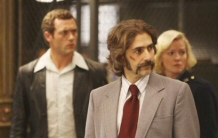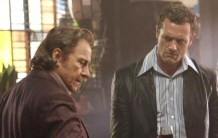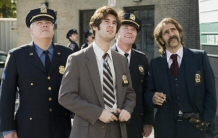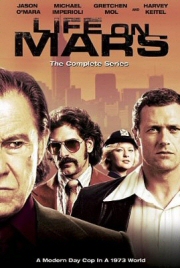The Complete Series
- Drama
- 2008
- Buy the DVD
All photos © ABC
Reviewed by Will Harris
()
here are good American adaptations of British series and there are bad adaptations of British series, but the real problem is this: once you’ve seen and loved the British version, can you ever divest yourself of your allegiance enough to be able to accept the American version?
Those who have seen and loved the BBC series, “Life on Mars,” will uniformly tell you that there was never any need to remake the show for an American audience, but that’s simply not true. Look at the concept: a homicide detective suddenly finds himself inexplicably transported from 2008 to 1973. The British might have done it first, but if you’re American, then you’re probably imagining a world with visuals inspired by “Starsky & Hutch” and its ‘70s cop-show peers, which is exactly what producers Josh Appelbaum, Andre Nemec, and Scott Rosenberg gave us.
Detective Sam Tyler (Jason O’Mara) begins the series in 2008, traveling with his partner/girlfriend, Maya Daniels (Lisa Bonet), but after being struck by a car while in pursuit of a suspect, he’s knocked unconscious.. and when he wakes up, he’s in 1973. The situation in which Sam finds himself quickly becomes even stranger when he finds that, even in the ‘70s, he’s still a cop named Sam Tyler, except that he’s part of the 125th Detective Squad under the command of Gene Hunt (Harvey Keitel).
The questions abound, not only for Sam, but also for the viewer. Has he really traveled back in time, or is this some strange fantasy that his brain has created while he’s in a coma? Sam even goes so far as to consider the possibility that it’s something to do with alien visitors. Though the question about how Sam got to 1973 is never far in the background, “Life on Mars” enjoys the opportunity to play with the cultural differences between then and now, offering up treatises on sexism, racial unrest, and even glam rock. Sam regularly finds himself interacting with people that he knew in his original time, but the most crucial (as you’d expect) are his own parents. He even gets the opportunity to have a heart-to-heart talk with himself at one point.

The cast of “Life on Mars” is top-notch throughout, but the masterstroke was pairing Keitel with Michael Imperioli, who plays Detective Ray Carling, a sexist blowhard who’s never far away from a politically incorrect remark. Jonathan Murphy, late of “October Road,” plays Detective Chris Skelton, the young buck on the squad who knows more about the era than Sam but doesn’t have nearly as much confidence, and Gretch Mol is Policewoman Annie Norris, known to the gang as “No-Nuts” Norris. (Yes, I think it’s fair to say that women didn’t exactly have the highest of standings in the NYPD in the ‘70s.)
If there’s a complaint to be made about “Life on Mars,” it’s that the dialogue is often so ridiculous that it takes you out of the moment. Yes, we’ve seen enough actual ‘70s cop dramas to know that the damndest expressions came out of policemen’s mouths back then, but even Keitel can’t always get away with some of the ridiculous stuff they hand him in the series. (Example: “You’re here to make me curse the day my father’s sperm asked my mama’s egg if it could have this dance.”) But the action is top-notch, the mystery of Sam’s presence in 1973 has you wondering throughout, and, basically, it’s a fun show with a lot of heart.
So did the American “Life on Mars” live up to the standards set by the British “Life on Mars”? I couldn’t say. I’ve never seen the original. I plan to watch it one of these days, but even when I do, I suspect it won’t tarnish my appreciation of this version. The biggest complaint that some people seem to have about ABC’s “Life” is the ending, which was a mixture of the incredibly literal and the faithful “Wizard of Oz”-inspired wrap-up. (“And you were there! And you, and you, and you!”) Personally, though, I thought it worked, and having reinvestigated the entire series, it’s clear that the producers had it planned out from the very beginning. Granted, they probably didn’t anticipate having to implement it so soon, but at least they had the chance to provide an ending.
Special Features: In addition to a couple of audio commentaries, a handful of deleted scenes, and a gag reel, we get three featurettes. The first, “To Mars and Back,” offers a lengthy look at how the show came to fruition and follow through to its conclusion, while “Sunrise to Sunset with Jason O’Mara” is a nice backstage look at the show’s star throughout a typical work day. The last of the bunch, though, sounded cool but proved disappointing. With a title like “Flashback: Lee Majors Goes to Mars,” you’d think you couldn’t go wrong, but it’s basically just O’Mara giving Majors a tour of the “Life on Mars” set and, as often as not, seemingly reading off a teleprompter about how awesome “The Six Million Dollar Man” was and how great “Life on Mars” is. But, okay, at least it was cool to see Lee Majors again.
 |
 |
 |
 |
 |
 |
You can follow us on Twitter and Facebook for content updates. Also, sign up for our email list for weekly updates and check us out on Google+ as well.













